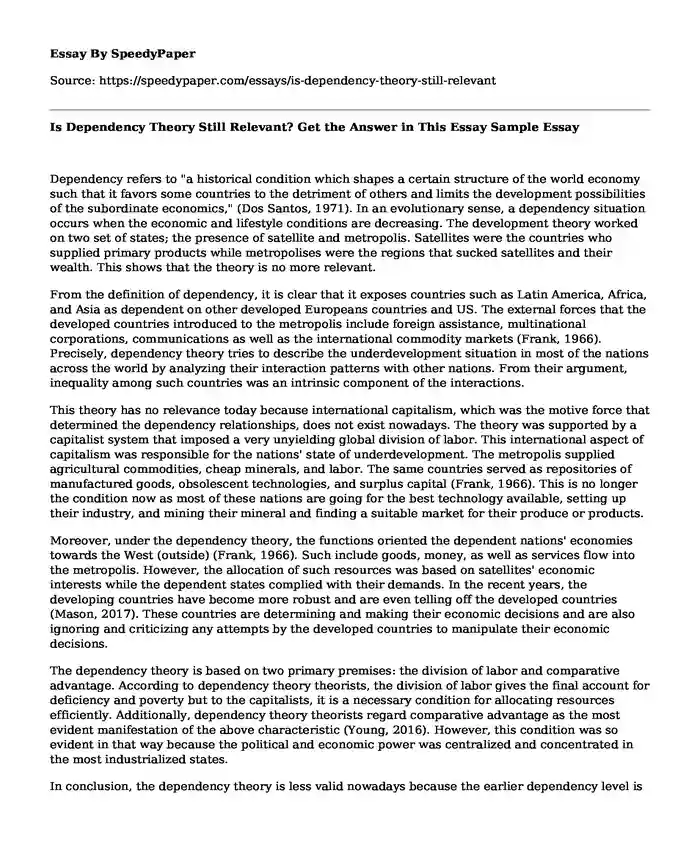Dependency refers to "a historical condition which shapes a certain structure of the world economy such that it favors some countries to the detriment of others and limits the development possibilities of the subordinate economics," (Dos Santos, 1971). In an evolutionary sense, a dependency situation occurs when the economic and lifestyle conditions are decreasing. The development theory worked on two set of states; the presence of satellite and metropolis. Satellites were the countries who supplied primary products while metropolises were the regions that sucked satellites and their wealth. This shows that the theory is no more relevant.
From the definition of dependency, it is clear that it exposes countries such as Latin America, Africa, and Asia as dependent on other developed Europeans countries and US. The external forces that the developed countries introduced to the metropolis include foreign assistance, multinational corporations, communications as well as the international commodity markets (Frank, 1966). Precisely, dependency theory tries to describe the underdevelopment situation in most of the nations across the world by analyzing their interaction patterns with other nations. From their argument, inequality among such countries was an intrinsic component of the interactions.
This theory has no relevance today because international capitalism, which was the motive force that determined the dependency relationships, does not exist nowadays. The theory was supported by a capitalist system that imposed a very unyielding global division of labor. This international aspect of capitalism was responsible for the nations' state of underdevelopment. The metropolis supplied agricultural commodities, cheap minerals, and labor. The same countries served as repositories of manufactured goods, obsolescent technologies, and surplus capital (Frank, 1966). This is no longer the condition now as most of these nations are going for the best technology available, setting up their industry, and mining their mineral and finding a suitable market for their produce or products.
Moreover, under the dependency theory, the functions oriented the dependent nations' economies towards the West (outside) (Frank, 1966). Such include goods, money, as well as services flow into the metropolis. However, the allocation of such resources was based on satellites' economic interests while the dependent states complied with their demands. In the recent years, the developing countries have become more robust and are even telling off the developed countries (Mason, 2017). These countries are determining and making their economic decisions and are also ignoring and criticizing any attempts by the developed countries to manipulate their economic decisions.
The dependency theory is based on two primary premises: the division of labor and comparative advantage. According to dependency theory theorists, the division of labor gives the final account for deficiency and poverty but to the capitalists, it is a necessary condition for allocating resources efficiently. Additionally, dependency theory theorists regard comparative advantage as the most evident manifestation of the above characteristic (Young, 2016). However, this condition was so evident in that way because the political and economic power was centralized and concentrated in the most industrialized states.
In conclusion, the dependency theory is less valid nowadays because the earlier dependency level is no more. Most of the developed countries have grown to make their independent economic decisions. Other premises attached to the theory such as war and depression and economic crisis are uncommon. Moreover, states have less or no influence on the decision that the multinational companies make regarding oversea investments. This theory should, thus, be updated.
References
Dos Santos, T. (1971). The Structure of Dependence, in K.T. Fann and Donald C. Hodges, eds., Readings in U.S. Imperialism. Boston: Porter Sargent, p. 226
Frank, A. G. (1966). The Development of Underdevelopment. Monthly Review 18 (4):17-31.
Mason, R. (2017). China's impact on the landscape of African International Relations: implications for dependency theory. Third World Quarterly, 38(1), 84-96.
Young, R. (2016). Postcolonialism: An historical introduction. John Wiley & Sons.
Cite this page
Is Dependency Theory Still Relevant? Get the Answer in This Essay Sample. (2022, Mar 11). Retrieved from https://speedypaper.net/essays/is-dependency-theory-still-relevant
Request Removal
If you are the original author of this essay and no longer wish to have it published on the SpeedyPaper website, please click below to request its removal:
- Several Ways to Be a Great Student - Free Essay in Education
- Free Essay on Female Characters and References in Shakespeare's Play Macbeth
- Never Let Me Go by Kazuo Ishiguro. Free Essay.
- Free Essay with a Speech Analysis: Obama Presidential Candidacy Announcement
- Essay Example on Marine Law
- Free Essay: Importance of Theory in the Practice of Public Health
- Essay Sample on Topic: Foreign Currency Hedging Methods
Popular categories





